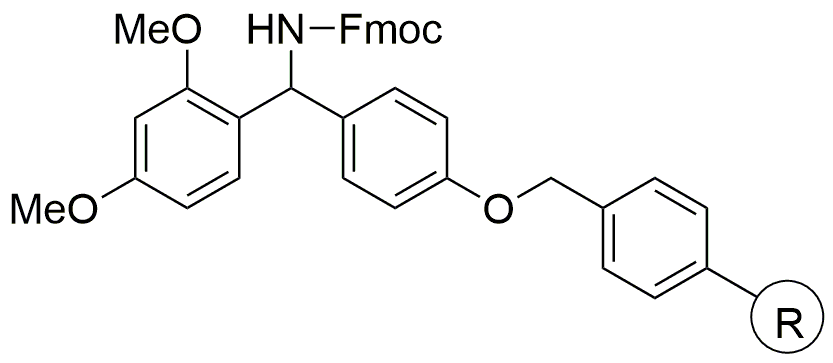4-(2', 4'-Dimethoxyphenyl-Fmoc-aminomethyl)-phenoxymethyl resin is widely utilized in research focused on:
- Peptide Synthesis: This resin serves as a solid support for the synthesis of peptides through solid-phase methods, allowing researchers to create complex peptide sequences efficiently.
- Drug Development: In pharmaceutical research, it aids in the development of new drugs by facilitating the synthesis of peptide-based therapeutics, which can lead to innovative treatments.
- Bioconjugation: The resin can be used to attach biomolecules, such as antibodies or enzymes, to surfaces or other molecules, enhancing the functionality of diagnostic tools and therapeutic agents.
- High-Throughput Screening: Its application in combinatorial chemistry allows for the rapid synthesis of diverse compound libraries, which is crucial for screening potential drug candidates.
- Custom Synthesis: Researchers can utilize this resin for tailored synthesis projects, enabling the creation of specific compounds that meet unique research needs or industrial applications.
General Information
Properties
Safety and Regulations
Applications
4-(2', 4'-Dimethoxyphenyl-Fmoc-aminomethyl)-phenoxymethyl resin is widely utilized in research focused on:
- Peptide Synthesis: This resin serves as a solid support for the synthesis of peptides through solid-phase methods, allowing researchers to create complex peptide sequences efficiently.
- Drug Development: In pharmaceutical research, it aids in the development of new drugs by facilitating the synthesis of peptide-based therapeutics, which can lead to innovative treatments.
- Bioconjugation: The resin can be used to attach biomolecules, such as antibodies or enzymes, to surfaces or other molecules, enhancing the functionality of diagnostic tools and therapeutic agents.
- High-Throughput Screening: Its application in combinatorial chemistry allows for the rapid synthesis of diverse compound libraries, which is crucial for screening potential drug candidates.
- Custom Synthesis: Researchers can utilize this resin for tailored synthesis projects, enabling the creation of specific compounds that meet unique research needs or industrial applications.
Documents
Safety Data Sheets (SDS)
The SDS provides comprehensive safety information on handling, storage, and disposal of the product.
Product Specification (PS)
The PS provides a comprehensive breakdown of the product’s properties, including chemical composition, physical state, purity, and storage requirements. It also details acceptable quality ranges and the product's intended applications.
Certificates of Analysis (COA)
Search for Certificates of Analysis (COA) by entering the products Lot Number. Lot and Batch Numbers can be found on a product’s label following the words ‘Lot’ or ‘Batch’.
Numéro de catalogue
Numéro de lot/série
Certificates Of Origin (COO)
This COO confirms the country where the product was manufactured, and also details the materials and components used in it and whether it is derived from natural, synthetic, or other specific sources. This certificate may be required for customs, trade, and regulatory compliance.
Numéro de catalogue
Numéro de lot/série
Safety Data Sheets (SDS)
The SDS provides comprehensive safety information on handling, storage, and disposal of the product.
DownloadProduct Specification (PS)
The PS provides a comprehensive breakdown of the product’s properties, including chemical composition, physical state, purity, and storage requirements. It also details acceptable quality ranges and the product's intended applications.
DownloadCertificates of Analysis (COA)
Search for Certificates of Analysis (COA) by entering the products Lot Number. Lot and Batch Numbers can be found on a product’s label following the words ‘Lot’ or ‘Batch’.
Numéro de catalogue
Numéro de lot/série
Certificates Of Origin (COO)
This COO confirms the country where the product was manufactured, and also details the materials and components used in it and whether it is derived from natural, synthetic, or other specific sources. This certificate may be required for customs, trade, and regulatory compliance.

